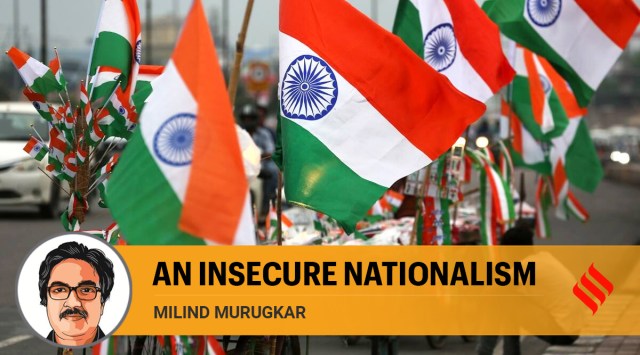- India
- International
An insecure nationalism has taken hold
Milind Murugkar writes: Partition Day signals an idea of India that is uncomfortable with history’s complexities
 The question is: Can this India ever be free? This is a legitimate apprehension because it is built upon shaky foundations, asks Milind Murugkar
The question is: Can this India ever be free? This is a legitimate apprehension because it is built upon shaky foundations, asks Milind Murugkar
The announcement that August 14 would be the day to remember the horrors of Partition is a manifestation of a new idea of India. This India believes in reliving historical wounds rather than getting over them.
Despite the already evident horrors of Partition, India celebrated its first Independence Day with high hopes. That India believed in a clear separation between religious identities and our identity as Indians. This view acknowledged the legacy of our ancient civilisation and also recognised that people of all religious identities participated in the freedom movement that led to the modern Indian state.
This doesn’t mean that this idea of India was rooted in a naïve understanding of the Hindu-Muslim relationship. It was aware of the complexity of this relationship — beautiful syncretism existing cheek-by-jowl with extreme conflicts and prejudices. However, without carrying the burden of history, it envisioned a modern India based on the value of individual dignity as enshrined in the Constitution, emphasising cultural convergence despite the tensions. In this view, modern India was not just a country that used modern science and technology. It was to be an India where everyone had the same inherent dignity regardless of her religion or any other identity.
It was an audacious dream for a country just partitioned along religious lines. In the past decades, this dream survived several jolts. But in recent times, it has been virtually shattered. The nationalism borne out of the Independence movement, and the idea of India it championed, is now on the verge of political defeat. Since the regime change in 2014, the process has intensified. Today, a new idea of India is casting its spell on the majority community.
The question is: Can this India ever be free? This is a legitimate apprehension because it is built upon shaky foundations.

The cultural nationalism of the RSS-BJP that forms the basis of this idea of India seeks its roots in medieval times when India was not a nation-state. Therefore, for this version of nationalism, Christianity and Islam and the accompanying cultures and lifestyles have come from “outside” — hence, they are foreign. Conflicts in medieval history are at the heart of this nationalism.
Where there is controversy about exactly what happened even in recent history, it is very difficult to talk with certainty about medieval history. And, how complicated is that history where the military constantly shifted its loyalty from one king to the other. This leaves scope for constructing history primarily based on one’s political ideology.
Just as Marxist historians look at everything through the lens of class, people influenced by the Sangh-BJP’s cultural nationalism tell us how cruel every Muslim king was. They do so by selectively imposing today’s value system on the medieval past.
Once Islam and Islamic culture are considered “external”, their every sign is a sign of the victory of these “foreigners” over the Hindus. Gandhi-Nehru-Patel’s idea of India never felt the need to change the name Aligarh to Harigarh. But this new idea of India can never be secure and open.
 Muslims have been part of this country for hundreds of years. And the fact that the impact of Islamic culture will remain in all spheres of Indian life will always vex the Sangh-BJP. No matter how much and how long the BJP-RSS enjoy political power, even under a leadership similar to the present one, this nationalism will remain entrenched in medieval history and will continue to suffer the pain of an imagined medieval “defeat”.
Muslims have been part of this country for hundreds of years. And the fact that the impact of Islamic culture will remain in all spheres of Indian life will always vex the Sangh-BJP. No matter how much and how long the BJP-RSS enjoy political power, even under a leadership similar to the present one, this nationalism will remain entrenched in medieval history and will continue to suffer the pain of an imagined medieval “defeat”.
Any form of nationalism bears the danger of becoming hostile to democratic principles. But a theoretically constructive possibility of nationalism is that it can also be useful for building social cohesion and brotherhood. But the Sangh-BJP’s cultural nationalism is intrinsically incapable of doing this.
This India cannot be at peace with itself. By announcing the Partition Horrors Remembrance Day, the Prime Minister has shackled it all the more with the chains of history.
This column first appeared in the print edition on September 20, 2021 under the title ‘An insecure nationalism’.
Murugkar writes on economic and social issues
EXPRESS OPINION
Apr 25: Latest News
- 01
- 02
- 03
- 04
- 05










































